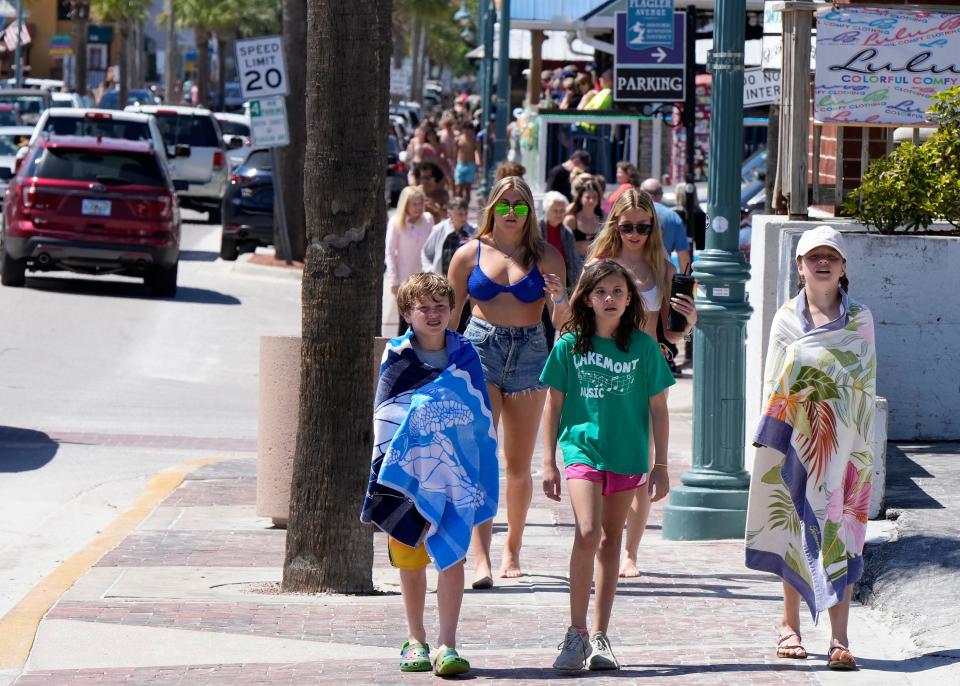What they're saying: Volusia officials slam House plan to revamp tourism revenue
DAYTONA BEACH — Volusia County tourism officials have added their voices to the chorus of criticism of a proposed bill working its way through the Florida House that would eliminate state funding for the Visit Florida tourism-marketing agency and replace it with money drawn from the 62 county tourist-development councils.
“Visit Florida is the lifeblood, the lifeline of bringing tourists to Florida,” said Bob Davis, president and CEO of the Lodging & Hospitality Association of Volusia County and a fixture in the county’s hotel industry for nearly 60 years. “It would be a disaster to cut those funds.”
In case you missed it: House plan to overhaul Florida tourism revenue not welcome by industry, counties
Here’s what you need to know about the proposal and the reaction to it:
What's in the bill?
Presented this week to the House Regulatory Reform & Economic Development Subcommittee, the legislation (PCB RRS 23-02) would require the state’s 62 tourist development councils — only five Florida counties don’t have them — to contribute a portion of their locally collected tourist development taxes to fully finance Visit Florida for the next three years.

The House otherwise would wipe out Visit Florida, having included no money for the agency in its budget proposal. The Senate, meanwhile, is recommending $80 million for the agency, while Gov. Ron DeSantis is seeking $100 million.
Visit Florida received $50 million from lawmakers last year and is considered by tourism advocates as an essential resource in helping the industry recover from the impact of back-to-back tropical storms Ian and Nicole this past fall.
Opponents of the proposal also are critical of the legislation’s requirement that counties hold voter referenda every six years to renew their tourist development taxes. At least 60% of voters would have to support the tax under the legislation, a threshold that likely could be difficult to overcome.
What is the tourist development tax?
The Local Option Tourist Development Act authorizes counties to levy five separate taxes on transient rental transactions (tourist development taxes or TDTs). Depending on a county’s eligibility and whether the county chooses to levy such taxes, the current TDT rate — more commonly known as the bed tax rate — varies from 0% to 6%.
By statute, the use of the funds is limited to capital construction of tourist-related facilities, tourist promotion, and beach and shoreline maintenance.
Statewide, TDT revenue has more than doubled over the past decade — from a total of $600 million in fiscal year 2012-2013 to a total of $1.5 billion in fiscal year 2022-2023, according to state figures.
Advocates of the proposed bill state that the impact of the counties’ contribution to support Visit Florida would be modest in the wake of that growth. Visit Florida would receive about $75 million in funding next year redirected from the counties, according to proponents of the bill.
How might the proposed bill affect Volusia County?
In Volusia County, tourism bed-tax collections had been on a record-setting pace after emerging from the downturn of the pandemic, a trend that was disrupted due to the impact of tropical storms Ian and Nicole in November.
More: Daytona Beach tourism works to weather impact of tropical storms Ian and Nicole
The county collects a 6 percent tourism tax on hotels and lodges with half of the revenues going to fund the county-run Ocean Center convention complex in Daytona Beach. The other half goes to the county’s three tourism ad authorities to market their respective areas — the Daytona Beach/Halifax area and Southeast Volusia and West Volusia — as tourist and special event destinations.

When Ian and Nicole arrived, Volusia County had just capped another robust year for tourism. For the fiscal year that concluded on Sept. 30, record-high overall tourism bed-tax collections of $33.7 million countywide were more than 20% higher than the previous year, which also set a record.
However, the monthly collection total for November, in the wake of the storms, showed a decline of 15.6% countywide compared with the same month a year ago, according to the Volusia County Revenue Division. In the coastal districts of Halifax and Southeast Volusia, collections for the month were down 16.5% and 22.8%, respectively.
In January, the most recent monthly figures available, bed tax collections totaled $2.9 million, 12.6% higher than the same month a year ago.
For the first four months of the 2022-23 fiscal year that began on Oct. 1, the countywide collection total is $8.6 million, which is 1.7% higher than the same period a year ago.
Critics of the bill point to the role that Visit Florida has played in bolstering tourism in the wake of unexpected disruptions that have ranged from hurricanes to the COVID-19 pandemic and the 2008 economic recession.
What Volusia tourism officials are saying
Visit Florida’s role in tourism promotion is vital, according to Lori Campbell Baker, executive director of the Daytona Beach Area Convention & Visitors Bureau.
“There is more competition today for visitors than ever before,” Baker said. “Visit Florida plays a critical role in helping smaller destinations like ours have a bigger voice in marketing to domestic and international audiences. Its advertising co-ops stretch our dollars in ways that are invaluable.
“Tourism plays an increasingly critical role in so many aspects of Florida’s success and economic prosperity, and tourism marketing pays huge dividends to us, as citizens.”
Davis, of the Volusia hotel association, urged those in the state’s hospitality industry to contact lawmakers to speak out against the House proposal.
“Visit Florida is a wonderful agency that’s doing its job, not only for tourism, but how about all the gift shops, restaurants, real estate and other businesses?” he said. “It’s an arm of Florida that shouldn’t be tampered with.”
This article originally appeared on The Daytona Beach News-Journal: Volusia tourism officials react to House plan for tourism revenue

